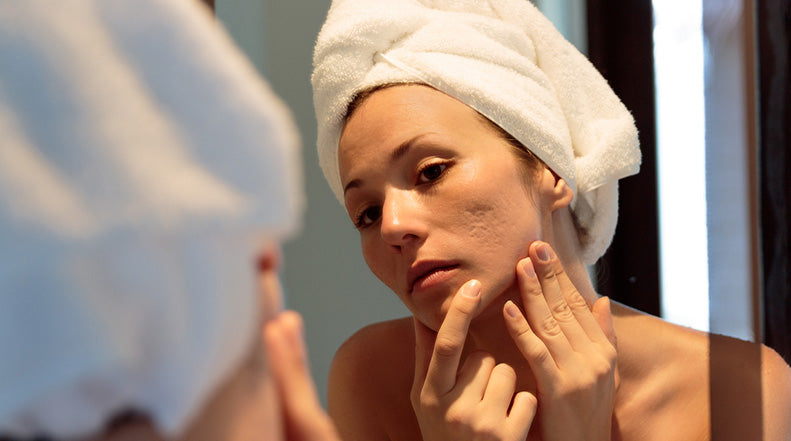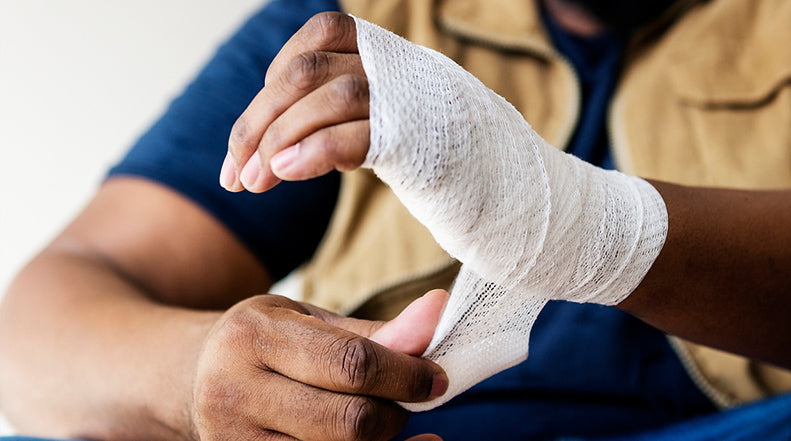How to Conceal Scars

Having a visible scar can make you feel incredibly self conscious. Luckily, with today’s treatments and technology there are several ways to reduce the noticeability of scars. Read on to learn how to conceal your scars and what to avoid so you don’t make them worse!
DON’T PUT MAKEUP ON AN OPEN WOUND
The most important time to keep your wound free of infection is while it is still open. Your open skin needs to be kept as clean as possible so that the healing process proceeds as efficiently as possible. Applying anything other than an antibacterial agent during this phase could hinder the healing process and cause a number of problems. While very tempting, applying makeup is not a good idea during this phase because it contains a variety of chemicals that could cause damage and slow healing. Makeup is also a source of bacteria because tubes and bottles can not keep it germ free. If you continue to cover your open or healing wound with makeup before it is healed, the scar that follows will likely be worse than originally possible.
It is best to accept that while your skin is healing, the area will be noticeable, especially if it is on your face. However, if you allow the healing process to take place without hindering it with makeup, you will be left with a much healthier scar that is able to be even further reduced.
CONCEALING SCARS WITH MAKEUP
Once your wound has closed and your skin has healed, a bit of makeup or cover up can actually help your scar. If you begin using makeup with SPF in it, your scar can benefit from this protection from the sun. UV rays from the sun can cause hyperpigmentation within the skin around the scar making your scar more noticeable.
Priming your skin before applying any makeup is a good idea especially when covering up a scar. Silicone scar gel can serve as a primer and help reduce scarring. Alternatively, there are several primers on the market that contain high levels of vitamin C which is incredibly effective for encouraging collagen levels within the skin. Producing new collagen will help replace the collagen that was broken down due to the injury. Using a primer will ensure that the scar is able to continue to heal properly even while its noticeability is reduced by makeup.
After priming you will want to go in with a full coverage foundation to conceal that scar. Not all foundations are created equal. For example, many look opaque in the bottle but are actually sheer. Also make sure the foundation won’t leave your skin looking shiny or dewy, as such formulas can actually make the scar more visible. You may also want to use concealer to minimize the appearance of any indentations or raised areas on your skin. It is best to apply the foundation with a foundation brush for the most even coverage. Beauty Blenders and beauty sponges can suck up a lot of product which takes away from coverage. After foundation and concealer, dust your face with a bit of powder to make sure the makeup stays in place throughout the day. Depending on the severity of your scar, makeup will reduce its appearance. However, while makeup can definitely help cover up any skin imperfection you may have, its power to conceal only goes so far.
INGREDIENTS TO STAY AWAY FROM
Avoid any makeup products that have skin lightening agents in them such as bleach or hydroquinone, which can be extremely harmful to the skin. Ingredients like this can really slow down the healing process and leave a worse scar behind than you would have originally had. When covering your scar with anything, be mindful of the ingredients and the formula. The main goal should be to allow the scar to still heal even while camouflaged.
REDUCING THE APPEARANCE OF YOUR SCAR
If you want a product that will actually treat your scar and reduce it, try a silicone gel. Topical, self-drying silicone gel is a common form of treatment that has been investigated in many clinical studies. In one study, 30 patients with scars of different types (including superficial scars, hypertrophic scars and keloids) had satisfactory results using silicone gel to lighten and decrease their scars. Silicone gel contains long chain silicone polymer, silicone dioxide and volatile components and has been reported to reduce texture by 86%, reduce color by 84% and reduce height of a scar by 68%.
Silicone gel is easy to apply and mild enough for sensitive skin. NewGel+ now offers multiple silicone gel products specifically formulated for facial scars. These encourage healing while protecting your scar. For scars 3 inches in length or less, NewGel+E Advanced Silicone Gel is a great option. A soft, silky gel that dries quickly, the gel takes minutes to apply and has no tacky or sticky residue. This gel is perfect for areas of the body that are visible and have frequent motion, such as your face, hands and neck.
Related Articles:
How Makeup Affects the Scar Healing Process and How to Reduce Scar Noticeability




Comments